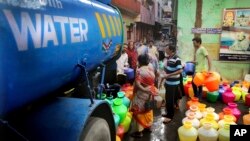March 22 is World Water Day. It is an opportunity to reflect on the importance of clean water, and on the implications of water scarcity.
Every person needs at least 20 liters of clean water per day for drinking, cooking, sanitation, and for hygiene needs. Yet today, some 2 billion people worldwide do not have access to safe drinking water.
Therefore, it is not surprising that water scarcity or the lack of access to a reliable source of clean water is an essential element of national security.
Water insecurity can lead to instability. Water scarcity can decrease food production and cause economic decline which, in turn, can lead to mass migration. A lack of reliable access to water can, and does, cause regional disputes, even armed conflicts. In the past, the threat of cutting off water supplies has been used to extort concessions or payments, while the destruction of water sources and infrastructure has been used as a weapon of war.
The disruption or destruction of water services by armed conflict can engender severe and far-reaching humanitarian consequences. That is because water services are interconnected. They are not only about water delivery and sanitation, but they also involve the availability, maintenance and repair of water systems and include the staff who must keep these systems operating, regardless of domestic or international turmoil.
That is why this year’s World Water Day campaign is called “Water for Peace.”
Globally, some 3 billion people depend on water that crosses national borders. Yet only 24 countries have cooperation agreements for all of their shared water.
But as the impacts of climate change, population growth and pollution increase, so does the need for transnational cooperation to protect, conserve and equitably share this precious resource. The lack of international agreements and proper water governance can exacerbate regional competition for water between countries and regions.
Ensuring that people everywhere have access to all of the clean water they need - where they need it, when they need it; reliably and
sustainably - requires global cooperation.
“Every person should have a right and the ability to have access to clean water,” said U.S. Vice President Kamala Harris, “and it should not matter where you live or how much money you earn or how much money you got in your back pocket.”














